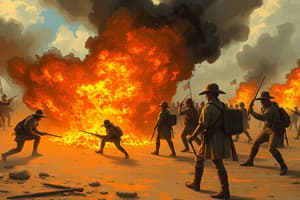Podcast
Questions and Answers
What was the primary reason for the US engaging in the war against Spain?
What was the primary reason for the US engaging in the war against Spain?
- To support Spain's claims in Cuba
- To retaliate for an attack on the USS Maine
- To expand its territory and establish colonies
- To protect American property in Cuba (correct)
What did the sinking of the USS Maine symbolize in the context of US public opinion?
What did the sinking of the USS Maine symbolize in the context of US public opinion?
- Justification for expansion into Asia
- A failure of American naval power
- The need for military action against Spain (correct)
- An internal conflict within the US military
Which amendment did Congress reference to justify their reluctance to enter war for territorial conquest?
Which amendment did Congress reference to justify their reluctance to enter war for territorial conquest?
- 5th Amendment (correct)
- 1st Amendment
- 3rd Amendment
- 10th Amendment
What concept did McKinley use to describe the US's claim to Hawaii?
What concept did McKinley use to describe the US's claim to Hawaii?
What was one of the main economic motivations for American expansion in Asia?
What was one of the main economic motivations for American expansion in Asia?
How did the domestic political climate influence the US approach to expansionism?
How did the domestic political climate influence the US approach to expansionism?
What did the term 'mission of benevolent assimilation' refer to in this context?
What did the term 'mission of benevolent assimilation' refer to in this context?
What role did the 'Yellow press' play in the events leading to the war with Spain?
What role did the 'Yellow press' play in the events leading to the war with Spain?
What was the main reason for the US to intervene in the Cuban conflict in 1898?
What was the main reason for the US to intervene in the Cuban conflict in 1898?
How long did the war against Spain last?
How long did the war against Spain last?
What was a significant outcome of the war for the United States?
What was a significant outcome of the war for the United States?
Which statement best describes the political landscape after the war?
Which statement best describes the political landscape after the war?
Which theorist advocated for the importance of naval power for a nation’s global strength?
Which theorist advocated for the importance of naval power for a nation’s global strength?
What attitude contributed to the US's justification for intervention in Cuba?
What attitude contributed to the US's justification for intervention in Cuba?
After defeating Spain, what was a major challenge faced by the US in the Philippines?
After defeating Spain, what was a major challenge faced by the US in the Philippines?
Which of the following territories did the US NOT acquire after the war?
Which of the following territories did the US NOT acquire after the war?
Flashcards are hidden until you start studying
Study Notes
The Spanish-American War: A Turning Point for the US
- The US had significant economic interests in Cuba due to its strategic value and desired its eventual inclusion in the American Union.
- The American public opinion condemned Spain's actions during the Cuban revolution for independence, urging Washington to intervene and alleviate the Cuban people's suffering.
- In 1898, the US Congress declared war against Spain, marking the first time in American history a declaration of war was issued.
- The US military achieved a swift and decisive victory against Spain in both Manila Bay and Cuba.
- The acquisition of Cuba, Philippines, Puerto Rico, and Hawaii transformed the US into an empire, extending its influence and economic interests globally.
- The war marked the first time American federal states fought as a united nation against a common enemy.
- The US's growing influence in the Western Hemisphere allowed it to compete with European powers on an equal footing.
- The war enabled the US president to assert greater control over foreign policy, consolidating presidential power over Congress.
American Imperialism: Motivations and Justifications
- The US sought to protect its economic interests and expand its influence abroad under the guise of "saving" Cuba from Spanish oppression.
- The sinking of the USS Maine in Havana harbor fueled public opinion against Spain, providing a catalyst for war.
- The US justified its expansionist agenda through concepts like "Manifest Destiny" and "benevolent assimilation," portraying its actions as a mission to spread liberty and democracy.
- The Philippines represented a crucial market for US goods, helping to alleviate overproduction and stimulate economic growth.
The Inevitability of American Power
- The US's rise to global power was presented as inevitable, distinguishing itself from European imperialism through a rhetoric of "benevolent" expansion.
Domestic Political Dynamics
- The US experienced a period of social crisis due to economic instability and mass European immigration, contributing to a national identity crisis.
- The war served as a unifying factor, fostering national pride and solidifying the US's position as a global power.
- The new imperial expansion impacted domestic politics by creating further divisions between different regions and social classes.
- American expansionism was a driving force in defining the US's national identity as a global power.
The Rise of American Naval Power
- The strategic thinking of Alfred Thayer Mahan emphasized the importance of naval power in establishing global dominance.
- Halford John Mackinder's geopolitical analysis emphasized the strategic importance of controlling key geographical areas to dominate continents.
Economic and Commercial Interests
- The desire to expand trade and secure access to new markets played a significant role in prompting American expansionism.
- The US government sought to secure economic dominance through its expanding military and political influence globally.
- The "Yellow Press" contributed to fueling public opinion and increasing support for the war through sensationalized news coverage.
Studying That Suits You
Use AI to generate personalized quizzes and flashcards to suit your learning preferences.




